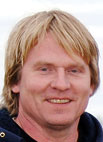
Forrest Lucas has become widely known as the Indiana truck driver turned entrepreneur with the development of a line of lubrication oils for vehicles. The Lucas name can also be seen on football stadiums, racetracks, racecars and other business ventures. It is also connected to a large registered cattle operation in Hickory County, Mo.
Lucas Cattle Company is comprised of about 16,000 acres, and produces registered Simmental, Angus and SimAngus seedstock, as well as commercial cattle.
“It’s all a single operation, but we have a commercial herd in Wheatland, (Mo.) and then we have the registered cattle and seedstock here in the Cross Timbers, (Mo.) area,” cattle manager Jeff Reed, who has been with Lucas Cattle Co., for about 13 years, explained. He said there are about 1,100 head of breeding-age females in the commercial herd, and about 1,200 on the registered side of the operation.
The main objective of Lucas Cattle Co., which was established around 2000, is to sell bulls that every cattleman can appreciate, and cattle that are fescue tolerant.
“We’ve got some registered breeders who buy from us, but our main customer base is those commercial producers,” Jeff said. “We are trying to produce bulls that will work for the guy who has 20 head or 500 head. We strive to develop bulls that will hold together and make sure they have a good weaning and yearling weight. Weaning weight is a big deal because a lot of our customers will sell calves at weaning. We also want docile bulls that also have good maternal traits. Some people like longer, framey cattle, some like something totally different. We want to try and produce bulls that will work well in a variety of herds and produce truly superior cattle in a lot of ways.”
Because of the number of cattle, the operation calves in both the spring and fall.
Breeding groups are made up of 20 to 25 females and one bull. Some groups are also broken down into first-calf and second-calf heifers.
“We will AI our first-calf heifers, and some of our second-calf heifers, just because they are young; we want them bred to a good calving ease bull, or to try new genetics,” Jeff said. “We will pick out some of our better cows to AI, if we want to try a cross with a certain percentage or pedigree.”
Once calves are weaned, the keep or cull process begins. Bull calves that are not candidates for future herd sires are banded and prepared for sale. The sale of the steers, as well as culled heifers, depends on market conditions.
“We want to get them through all of the stress of weaning, then make that first cut of the real obvious ones and those that we don’t feel are going to make a great bull,” Jeff said. “We’ll wait a couple more months and look that them again, making a second or even a third cut on what will make a great bull and what won’t, so that we can get our numbers down to where we feel like we have the right number of bulls to offer. As a result, our sales increase each year.”
Two buying events, which are held the second Saturday in April and the second Saturday in October, are held at by Lucas Cattle Company.
“We have what we call an open house bull sale and it is the first offering of the bulls,” Jeff said. “It allows everyone to get a first-chance at the yearling bulls. We were having our own production sale, but there is a lot of cost and labor involved in that and it wasn’t giving us the results we wanted, so we just started selling through private treaty. Then, we had guys coming back and wanting first pick, but you can’t give 10 guys a first pick. The open house, I feel, has given everyone an opportunity to have a first chance at the bulls. We will also, off and on, sell some heifers at our sales, but it really depends on the market and on what we are trying to do with the herd.” Jeff added that bulls are offered to buyers year round at the ranch.
About 70 to 125 heifers are retained annually in both the commercial and registered herds as replacement heifers.
The Simmental, Angus and SimAngus aren’t the only cattle roaming Lucas Cattle Co. More than 100 breeding-age female Longhorns are also part of the cattle operation.
“They’ve been here since Forrest bought the place,” Jeff said. “Forrest likes looking at them, but they are really hardy animals. You can put them off in the brush and they will do well. We will put a good homozygous black, polled bull on them and it will take a lot of the color and the horns off them and we sell those calves pretty well. We normally put a heavy birth weight bull on them that a lot of people would be scared of, but those Longhorns will have a small calf that will jump and go like crazy.”
While Jeff heads up the cattle operation, Gary Hubert is the operations manager for Lucas Cattle Co. Jeff said Forrest Lucas is involved in the cattle operation as much as possible.
“We all kind of put our heads together on things,” Jeff said.







